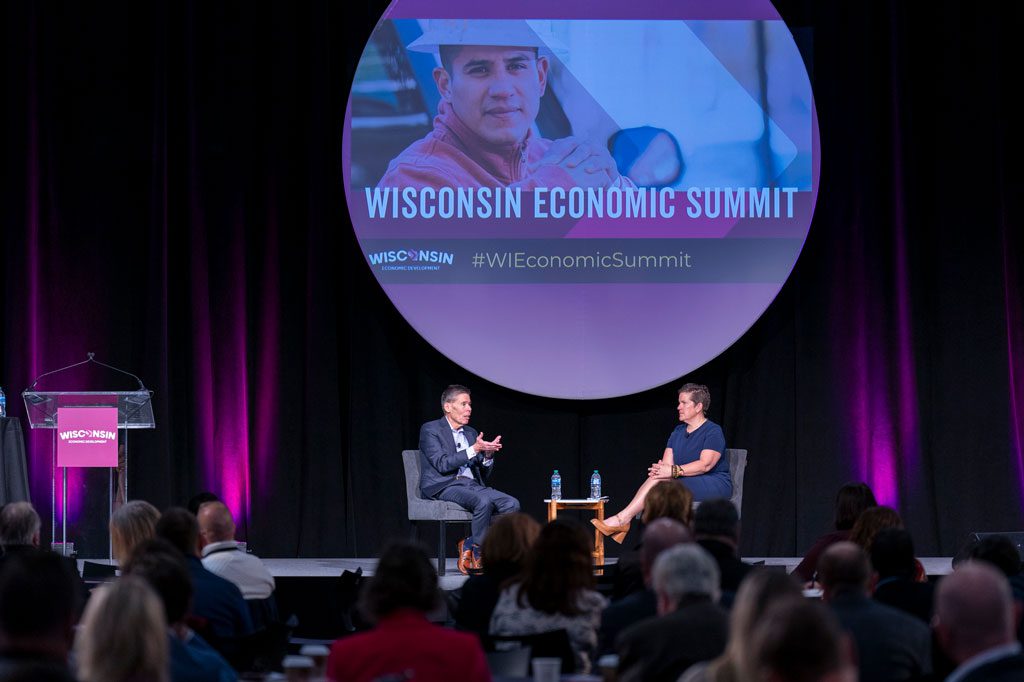
WEDC Secretary Missy Hughes and Motive Partners Chairman Jeff Yabuki discuss leadership at the 2023 Wisconsin Economic Summit.
Building an Economy for All, in which every Wisconsinite can access opportunity and thrive, requires creating connection.
The thread of connecting people, businesses, nonprofits, and government to collaboratively solve problems and achieve success ran through the second annual Wisconsin Economic Summit, held at Appleton’s Fox Cities Exhibition Center in late October.
“WEDC is focusing on the very people at the heart of Wisconsin,” said Missy Hughes, WEDC’s secretary and CEO. “They’re the people showing up for work every day, the people opening the doors of their businesses on Main Streets, the people running enormous businesses and employing lots of people … We’re putting them at the center of our work.”
More than 400 people from across Wisconsin attended the summit and walked away with perspectives on connecting companies with workers, making public-private projects come to life, connecting struggling urban neighborhoods with financial resources needed to remake themselves, and more.
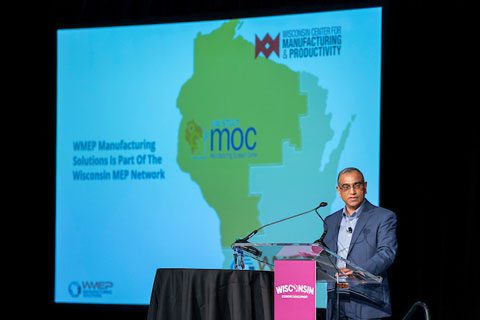
WMEP Manufacturing Solutions CEO Chris Baichoo
As businesses work to attract and retain employees, Chris Baichoo urged employers to connect with prospective workers by meeting their expectations, treating them as individuals, and fashioning new corporate cultures.
Baichoo, executive director and CEO of WMEP Manufacturing Solutions, said a recent survey of 415 state manufacturers found that 81% are struggling to find new employees. “You’ve got to start treating your employees as customers. You’ve got to give them what they want so they come on board,” he said.
He also urged training for frontline managers, customized advancement programs for team members, creating mentorship programs to pass down the knowledge of tenured employees before they retire, and making it easy for would-be employees to apply online.
Succeeding in the marketplace is another way to engage not only employees, but shareholders. Jeff Yabuki, chairman of equity firm Motive Partners and former CEO of Fiserv, said his tenure at Fiserv was marked by innovation and informed risk-taking that delivered a 969% shareholder return in just 14 years.
That run was marked by a willingness to adopt new ways of thinking.
“It’s the people in any organization that get the work done, but this success allowed them to live better lives, to send children to college, to buy homes, to give back and to retire in a way that they may never have believed was possible,” he said.
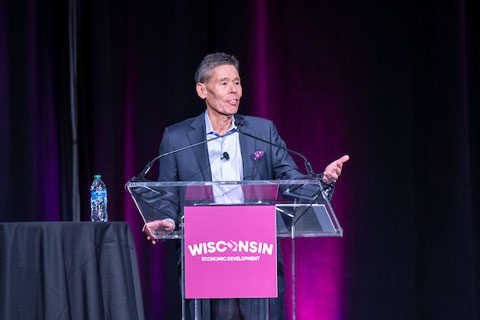
Yabuki urged listeners to harness the potential of artificial intelligence while being mindful of its limitations.
Yabuki urged people to separate technology from innovation and harness the potential of artificial intelligence while being mindful of its limitations. And he advocated connecting with employees and tapping their expertise.
“Command-and-control is dead,” he said. “These are the times of diversity, inclusion, personal life balance, empathy, and—very importantly—the vulnerability of leadership that will unlock the true potential of a workforce. … The same-old, same-old just won’t work for Wisconsin business to thrive.”
Connection is also at the heart of urban revitalization in Milwaukee, where the Northwest Side Community Development Corporation (NWSCDC) is helping to breathe new life into abandoned and neglected areas by harnessing the power of partnership.
The group helps bring lenders to the table to catalyze development in neighborhoods struggling with disinvestment. It also makes loans of between $250,000 and $1 million to bring projects to life.
For instance, the organization helped finance Wisconsin’s first Black-owned Culver’s franchise and the first Black- owned gas station in the state.
A current project involves the renovation of a long-vacant private school on North 40th Street. There, the group is working with ownership to provide financing and technical assistance to develop a nationally accredited child care center.
The project is structured to share ownership with the center’s employees. “Child care teachers don’t make much money. This is an opportunity for them to share the wealth of this facility,” said Willie Smith, NWSCDC’s executive director.
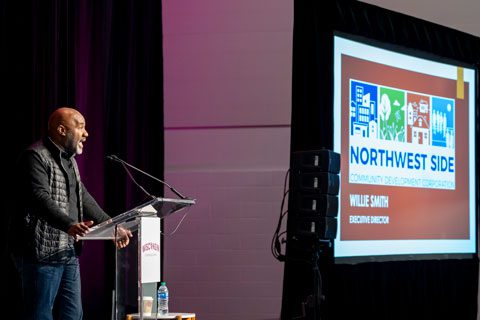
Northwest Side Community Development Corporation Executive Director Willie Smith
In time, he said the center could convert its ownership to nonprofit status and seek funding to support the teachers and continue its work.
“It’s a shame there’s only one Black-owned gas station in and one Black-owned Culver’s in Wisconsin,” he said. “We’re building coalitions so more of these things can happen. If we’re not in a place to move the needle forward, we’ll stay right where we are, which is not a place any of us are happy with.”
To thrive as an Economy for All, employers, government, and communities need to join forces to build a mutually beneficial infrastructure. Today, that especially means providing high-quality childcare and practical transportation solutions.
Dr. Dipesh Navsari, of the University of Wisconsin-Madison School of Medicine and Public Health, said early childhood education provides safe, stable, and nurturing relationships. He added that studies have shown that between $4 and $9 is returned for every $1 invested in early childhood programs.
And while more than half of Wisconsinites live in an area designated as a child care desert—an area in which at least there are three young children for every available child care spot, and these spots often come at a high price—government programs are trying to soften the blow.
“The annual cost of care for one infant is more than a year’s worth of in-state tuition at a four-year college,” said Daria Hall, policy initiatives advisor for the state Department of Children and Families. “Think about the impacts of these costs, particularly when families are the youngest and they are earning the least they’re going to be earning. You think about college, and we’re saving for decades for college—and these are costs that hit right as these families are starting to form.”
The Childcare Counts program provides subsidies to reduce the cost of child care for 16,000 low-income families in job training or in school.
Another, called Partner Up, supports businesses that offer their staff members free child care spots. The businesses pay a quarter of the cost, with the state picking up the rest. The Dream Up program, meanwhile, provides $75,000 to communities to assess their needs in expanding child care access.
In Reeseville, business was a powerful driver of another partnership initiative. Paul Scharfman, president of the Specialty Cheese Company, said his fast-growing business achieved the difficult feat of tripling employment even in a very tight labor market.
He partnered with the University of Wisconsin-Madison demographic experts and found that child care, transportation, and housing were prime concerns for potential new hires. Scharfman set up a ride share program that costs him $20 per person each day. Then, he decided to pay $20 per employee each day for child care.
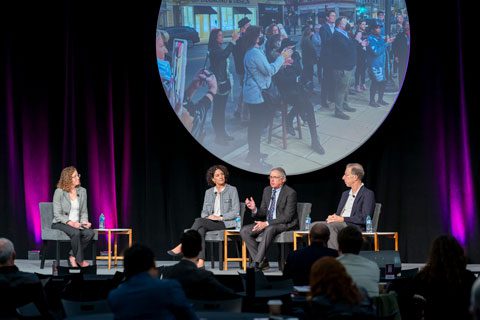
Errin Welty of WEDC, Tina Crave of the Greater Watertown Community Health Foundation, Tim Casey of the City of Kenosha, and Paul Scharfman of Specialty Cheese Co.
Scharfman went further, enlisting experts and local government officials to make a community child care plan and found out how he could set up a child care center. He donated six acres adjacent to his plant, and construction will begin soon on a community child care center that will ultimately have 45 spots.
“My guess is, in coming years, my company will employ all of the staff at the child care center, give them our company’s full benefit package, and then rent them to the child care center,” Scharfman said to applause from the audience. “That’s collaboration. I win; the community wins. Most importantly, the children, win.”
Addressing transportation needs is also vital, experts said. A Milwaukee County-Waukesha County partnership was awarded a Workforce Innovation Grant to remove transportation barriers for workers.
Eight partners of Mobilise expanded the FlexRide program, which positions child care centers as “mobility hubs” that also serve as pickup spots for FlexRide riders.
Amanda Payne, senior vice president for public policy for the Waukesha County Business Alliance, said the partnership is essential to maintain a strong workforce.
“Our employers have a huge need for workforce. There are lots of available positions, lots of good positions—and so, for us, the flexible, on-demand transportation solution has been key,” she said.
In largely rural Waupaca County, a Workforce Innovation Grant funded Catch-A-Ride, a 24/7 ride share program that mobilized government, communities, businesses, and nonprofits to tackle the transportation problem.
“If you want to improve your economic situation, you have to be able to get to a job or get to health care or get to resources. … Without transportation, we create walled gardens of opportunity,” said Valerie Lefler, founder and executive director of the nonprofit Feonix-Mobility Rising, one of the project’s partners.
Meanwhile, community leaders across Wisconsin are connecting with government and business to unlock economic and civic success.
In Kenosha, the community partnered with government on a pair of projects: the Kenosha Emerging Leaders Academy (KELA) and the Kenosha Innovation Neighborhood (KIN).
Youths from sixth-graders up to their early 20s participate in KELA, a partnership providing technical skills training, mentorship, and academic support to prepare them for job opportunities.
KIN—with a children’s library, retail, restaurants, and housing—will build on a 107-acre vacant former factory site that required $50 million in state and federal cleanup assistance and an area destroyed by rioting and civil unrest in 2020.
“We will rebuild, and we will do better: That’s been the ethos that has permeated Kenosha for the last three years,” said Tim Casey, Kenosha’s city development director. “People have said, ‘What can we do? How can we work together?’”
In Jefferson County, employers struggle to recruit workers because of a lack of available housing.
Tina Crave, president and CEO of the Greater Watertown Community Health Foundation, said the first step was conducting a study that found the area is 3,500 units short of the housing it needs.
It partnered with Thrive Economic Development, WEDC, and Jefferson and Dodge counties to form the Heartland Housing Initiative, a program to bring hands-on housing development assistance to municipalities there.
Heartland is funded with federal, county, and philanthropic funds to help overcome the lack of capital that was a barrier to more housing development. In September, it rolled out a revolving loan fund to help spur housing development. So far, $3 million is committed to the fund, and Heartland hopes to raise up to $10 million to ease the county’s housing crunch.
Crave understands the power of connection highlighted throughout the summit and how it can be used to create engagement and success.
“It’s really easy to get people to come to the table and complain about problems,” Crave said. “The hard part is helping individuals understand what they can do. I think that starts with helping understand the root causes behind the problem.”
The third annual iteration of the event is already in the planning stages, with the 2024 Wisconsin Economic Summit scheduled to take place Oct. 15-16 in La Crosse.
